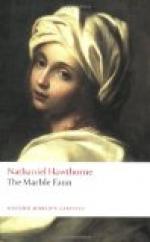From some mysterious source, as the sculptor felt assured, a soul had been inspired into the young Count’s simplicity, since their intercourse in Rome. He now showed a far deeper sense, and an intelligence that began to deal with high subjects, though in a feeble and childish way. He evinced, too, a more definite and nobler individuality, but developed out of grief and pain, and fearfully conscious of the pangs that had given it birth. Every human life, if it ascends to truth or delves down to reality, must undergo a similar change; but sometimes, perhaps, the instruction comes without the sorrow; and oftener the sorrow teaches no lesson that abides with us. In Donatello’s case, it was pitiful, and almost ludicrous, to observe the confused struggle that he made; how completely he was taken by surprise; how ill-prepared he stood, on this old battlefield of the world, to fight with such an inevitable foe as mortal calamity, and sin for its stronger ally.
“And yet,” thought Kenyon, “the poor fellow bears himself like a hero, too! If he would only tell me his trouble, or give me an opening to speak frankly about it, I might help him; but he finds it too horrible to be uttered, and fancies himself the only mortal that ever felt the anguish of remorse. Yes; he believes that nobody ever endured his agony before; so that—sharp enough in itself—it has all the additional zest of a torture just invented to plague him individually.”
The sculptor endeavored to dismiss the painful subject from his mind; and, leaning against the battlements, he turned his face southward and westward, and gazed across the breadth of the valley. His thoughts flew far beyond even those wide boundaries, taking an air-line from Donatello’s tower to another turret that ascended into the sky of the summer afternoon, invisibly to him, above the roofs of distant Rome. Then rose tumultuously into his consciousness that strong love for Hilda, which it was his habit to confine in one of the heart’s inner chambers, because he had found no encouragement to bring it forward. But now he felt a strange pull at his heart-strings. It could not have been more perceptible, if all the way between these battlements and Hilda’s dove-cote had stretched an exquisitely sensitive cord, which, at the hither end, was knotted with his aforesaid heart-strings, and, at the remoter one, was grasped by a gentle hand. His breath grew tremulous. He put his hand to his breast; so distinctly did he seem to feel that cord drawn once, and again, and again, as if—though still it was bashfully intimated there were an importunate demand for his presence. O for the white wings of Hilda’s doves, that he might, have flown thither, and alighted at the Virgin’s shrine!




